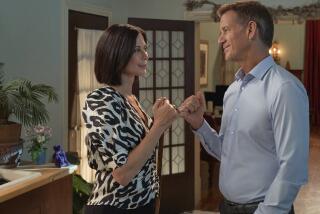Blood, gore, more in ‘Dark Ages’
Like some torture with your storytelling? “24” is kid’s stuff. Is massive bloodletting your kind of entertainment? “The Departed” is too tame to even consider.
But if you like history that packs a wallop, with battlefield bodies piling up like cordwood and rats spreading bubonic plague, check out “The Dark Ages,” set for 9 p.m. Sunday on the History Channel. It’s a fast, engrossing look at the largely forgotten centuries between the fall of Rome (AD 410) and the First Crusade (1095). The re-creations are vivid and the language is plain. The Visigoths who sacked Rome were a bunch of “dirty, sweaty, smelly thugs.” The military strategy of Alfred the Great was rope-a-dope, and the fabled knights were “more Tony Soprano than Lancelot.”
It’s history the way they don’t teach it in school: a romp through the carnage and treachery that spread from Europe to the East and to the Holy Land. Academics provide information and, more important, enthusiasm for the topic. “Dark’s” argument is that to understand the Renaissance that was to come, or to comprehend the modern world, you’ve got to tackle this six-century period of violence and upheaval that shaped the map and mores of Europe. To know where you are, it helps to know where you’ve been, etc.
“Dark” explains how Rome fell through political incompetence, cruelty and then a two-year siege by the Visigoths, led by Alerick, whose beef seems to have been his inability to win a promotion in the Roman army. The personal and the political are mixed together. In turn come the Goths, Franks, Britons and Saxons, barbarians all. In Britain, the Vikings slaughter and pillage. If invading armies didn’t kill you, the bubonic plague, measles or smallpox would; or maybe starvation, as cities were surrounded and farming declined (possibly due to a centuries-long “mini ice age”).
There are set pieces about major figures. Charlemagne comes off as a hero, although not without a mean streak. Clovis, king of the Franks, had an interesting way of dealing with annoying relatives: He killed them. Pope Urban II is often seen as a zealot and maniac for starting the first of what proved to be nine crusades stretching over 200 years in an effort to “take back” Jerusalem. Maybe, but as “Dark” points out, the crusades, by bringing education and other advances from the East back to Europe, helped bring to a close the long night of suffering.
The role of Christianity as both a unifying and divisive force is a major theme of “Dark.” While popes were scheming, Benedictine monks slaved away to copy manuscripts and save knowledge from extinction. If there is a jewel inside “Dark,” it’s the portrayal of Emperor Justinian I and his courtesan wife, Empress Theodora. Mr. and Mrs. Macbeth were missionaries compared to this power couple. When their hold on Constantinople was threatened, they tricked 30,000 rebels into a horse-racing stadium and had them butchered. Now that’s hardball politics.
“Dark” has it all: sex, religion, sports, politics, war and more. And the Oscar goes to....
*
‘The Dark Ages’
Where: The History Channel
When: 9-11 p.m. Sunday
Rating: TV-PG-V (may be unsuitable for young children, with an advisory for violence)

